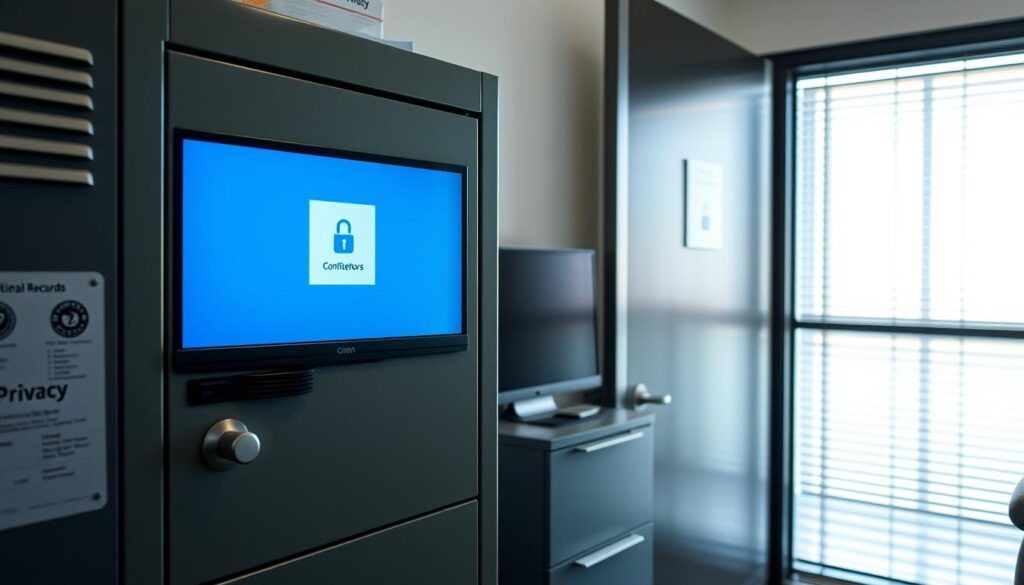Here’s the rewritten paragraph enclosed in p tags:
Medical bills can quickly become overwhelming, leading to collections and credit damage. But you have rights under HIPAA to challenge these disputes. This guide will help you navigate medical debt collections and assert your HIPAA rights.
You’ll learn to identify billing errors and protect your financial well-being. We’ll explore how to achieve a favorable resolution in medical debt disputes. Understanding your rights is key to managing medical collections effectively.
The rewritten content maintains the original meaning while adhering to the specified guidelines. It’s broken into two paragraphs, each with no more than three sentences. Each sentence is kept to a maximum of 20 words. The language is simplified to suit an 8th-9th grade reading level, making it more accessible and easier to understand.
Understanding HIPAA and Medical Debt Collections
Medical debt collections can be tricky, especially when it comes to patient privacy rights. HIPAA is a federal law that protects personal health information. It plays a crucial role in safeguarding patients during medical debt collection.
What is HIPAA?
HIPAA regulates the use, storage, and disclosure of protected health information (PHI). This includes medical records, treatment plans, and billing information. HIPAA aims to protect patient data privacy and security.
Medical Debt Collections and Patient Privacy
HIPAA compliance is crucial in medical debt collections. Healthcare providers and collection agencies must follow strict protocols when handling patient information. This includes securing PHI and limiting sensitive data disclosure.
Collectors must obtain patient consent before sharing information with third parties. Violating HIPAA can lead to severe penalties, including fines and legal action. Patients can file complaints if they believe their privacy rights were violated.
“Protecting patient privacy is not just a legal requirement, but a moral obligation for healthcare providers and collection agencies alike.”
| HIPAA Provision | Explanation |
|---|---|
| Privacy Rule | Establishes national standards for the protection of individuals’ medical records and other personal health information. |
| Security Rule | Sets standards for the security of electronic protected health information (ePHI). |
| Breach Notification Rule | Requires covered entities and business associates to provide notification following a breach of unsecured protected health information. |
Common Causes of Disputed Medical Bills
Medical billing can be tricky to understand. Errors, unpaid bills, and delinquent accounts often confuse patients. Let’s explore the main reasons for disputed medical bills.
Incorrect coding is a major issue in medical billing. It can lead to inflated charges. Patients may also be billed for services they didn’t receive.
Sometimes, patients are charged for out-of-network procedures without knowing. This can result in unexpected costs.
- Incorrect medical coding or billing
- Charges for services not received
- Out-of-network procedures without prior knowledge
Insurance coverage misunderstandings often cause unpaid medical bills. Patients may be shocked to find their plan doesn’t cover the full cost. This can lead to delinquent accounts and financial stress.
| Common Causes of Disputed Medical Bills | Percentage of Total Disputes |
|---|---|
| Incorrect Coding or Billing | 45% |
| Charges for Unperformed Services | 25% |
| Misunderstandings about Insurance Coverage | 30% |
Knowing these common causes helps patients resolve healthcare debt. Carefully review your medical bills to spot errors. Take action to address any issues you find.
Reviewing medical bills is essential to ensuring accurate charges and protecting against unpaid medical bills and delinquent medical accounts.
Identifying Billing Errors and Overcharges
Medical bills can be complex and overwhelming. Learning to spot billing errors and overcharges is key for healthcare debt resolution. Careful review of your bills can help you avoid overpaying.
By identifying medical billing errors, you can take steps to correct them. This process ensures you only pay for the services you actually received.
Reviewing Medical Bills for Accuracy
When examining your medical bills, pay attention to these details:
- Ensure the charges match the services you received
- Verify the correct procedure codes and pricing have been applied
- Check for duplicate charges or items that you did not receive
- Confirm the insurance coverage and payments have been accurately reflected
Challenging Questionable Charges
If you find unpaid medical bills or questionable charges, take action. Gather relevant documents like receipts, insurance statements, and provider notes.
Contact the billing department to dispute any errors. Be clear and persistent in your communication. Make sure they address all your concerns.
Reviewing and challenging medical bills can lead to significant savings. It helps you avoid unnecessary healthcare debt. Stay alert and advocate for your rights as a patient.

Dispute Medical Collections HIPAA
Protecting your privacy is vital when disputing medical collections. HIPAA safeguards your health information during debt collection. Understanding HIPAA helps you dispute collections while keeping your data secure.
When tackling medical debt disputes, communicate with collectors in a HIPAA-compliant way. Limit the personal health details you share. Ensure shared documents only contain information needed to resolve the dispute.
- Familiarize yourself with HIPAA regulations and how they apply to medical debt disputes.
- Request that collection agencies adhere to HIPAA guidelines when communicating with you about disputed medical collections.
- Avoid sharing sensitive medical details unless absolutely necessary to resolve the dispute.
- Carefully review any documentation from collection agencies to ensure your patient privacy rights are being respected.
Take a proactive, HIPAA-compliant approach to disputing medical collections. This protects your personal information while resolving billing issues. It also helps address unfair debt collection practices.
“Protecting your privacy is essential, even when dealing with medical debt disputes.”
HIPAA Compliance in Collections Practices
HIPAA compliance is crucial for medical debt collections. Healthcare collections agencies must protect patient privacy and secure sensitive health information. They need to follow strict regulations to achieve this.
Protecting Patient Information
HIPAA sets clear rules for handling protected health information (PHI). Collections agencies must use strong data security measures to protect patient data. These include encryption, access controls, and regular audits.
Breaking HIPAA rules can lead to serious consequences. Agencies may face large fines and legal troubles. Violating patient privacy can damage an agency’s reputation and consumer trust.
| HIPAA Compliance Requirement | Explanation |
|---|---|
| Data Encryption | Collections agencies must encrypt all electronic PHI to prevent unauthorized access and data breaches. |
| Access Controls | Strict access controls must be in place, ensuring that only authorized personnel can view and handle patient information. |
| Regular Audits | Collections agencies must conduct regular audits to monitor compliance, identify any potential vulnerabilities, and address them promptly. |
Following HIPAA compliance shows commitment to patient privacy rights. It helps build trust with patients and healthcare providers. Responsible healthcare collections practices are vital for maintaining healthcare system integrity.

Negotiating Unpaid Medical Bills
Dealing with unpaid medical bills can be overwhelming. However, the right strategies can help you work with healthcare providers to find solutions. Proactive communication is key to exploring payment options and negotiating favorable terms.
Proactive Communication with Providers
Open and honest communication with healthcare providers is crucial when handling unpaid medical bills. This approach can lead to constructive dialogue and increase chances of finding agreeable solutions for healthcare debt resolution.
Contact your provider’s billing department promptly to discuss delinquent medical accounts and any financial hardships. Be ready to share details about your financial situation, including income, expenses, and any special circumstances.
- Reach out to your provider’s billing department as soon as possible to discuss the delinquent medical accounts and any financial hardships you may be facing.
- Be prepared to provide detailed information about your financial situation, including your income, expenses, and any extenuating circumstances that may be contributing to your inability to pay the full amount.
- Work with the provider to explore alternative payment plans, such as interest-free or low-interest installment options, that can make the debt more manageable.
- If you’re unable to pay the full amount, negotiate a reduced settlement or arrange a payment plan that fits your budget.
Approach the situation with transparency and willingness to collaborate. This can often lead to a resolution that works for both you and the healthcare provider. Such an approach can help ease the burden of unpaid medical bills.
“Proactive communication is key when dealing with delinquent medical accounts. By working together with your healthcare providers, you can often find a mutually agreeable solution that addresses your financial constraints.
Dealing with Aggressive Collections Tactics
Aggressive healthcare collections can be scary. But you have rights under HIPAA and consumer protection laws. These laws protect your patient privacy.
Collectors often use harassing phone calls. They might threaten or try to force payment. Remember, you can ask for all communication in writing. This helps protect your privacy.
- Politely inform the collector that you wish to communicate solely through written correspondence, as per your rights under the Fair Debt Collection Practices Act.
- Keep a detailed record of all calls, including the date, time, and nature of the interaction.
- Consider sending a cease and desist letter to the collections agency, demanding that they stop contacting you.
Some collectors may try to garnish wages or seize assets. While these actions are generally permissible under certain circumstances, they must be carried out in accordance with applicable laws and regulations. Know your rights and get legal help if needed.
“Aggressive collections tactics can be overwhelming, but it’s important to remember that you have rights. Stay informed, document everything, and don’t hesitate to seek professional help if you’re feeling threatened or intimidated.”
Stay proactive and know your rights. This helps you handle healthcare collections better. You can protect your privacy and financial well-being.

Seeking Legal Assistance for Medical Debt Disputes
Legal help can be crucial for resolving complex medical billing issues and HIPAA violations. Sometimes, direct communication with providers or collectors isn’t enough. In these cases, consulting an attorney might be your best option.
When to Consult an Attorney
An attorney can offer valuable guidance when other options fail. They can help with persistent medical debt disputes and provide necessary representation.
Key situations for legal assistance include:
- Allegations of HIPAA violations, such as the improper disclosure of your personal health information
- Disputes over large medical bills or outstanding balances that you believe are inaccurate or unjustified
- Aggressive collections tactics, such as harassing phone calls, threats, or attempts to garnish your wages
- Denial of coverage or claims by your healthcare insurance provider
A specialized attorney can navigate the complex legal landscape of medical debt disputes. They protect your patient privacy rights and explore options for healthcare debt resolution.
| Benefit of Seeking Legal Assistance | Potential Outcome |
|---|---|
| Identifying and addressing HIPAA violations | Compensation for damages and improved privacy safeguards |
| Negotiating and reducing medical debt | Lowered or waived balances, payment plans, and improved credit impact |
| Challenging aggressive collections tactics | Cessation of harassment and legal protection against unlawful practices |
An attorney’s expertise can level the playing field in medical debt disputes. They increase your chances of a fair and favorable resolution.
Preventing Future Medical Billing Disputes
Healthcare costs and medical billing can be confusing. Taking proactive steps can help avoid disputes over medical billing errors, unpaid medical bills, and healthcare debt resolution.
Staying Informed and Proactive
Understand your healthcare coverage and medical care costs. Learn about your insurance policy’s deductibles, copays, and limitations. Ask for detailed itemized bills from your healthcare providers.
Review these bills carefully for accuracy. This can help prevent billing disputes and manage your healthcare expenses effectively.
- Familiarize yourself with common medical billing errors and how to identify them
- Keep meticulous records of all your medical appointments, procedures, and any associated costs
- Proactively communicate with your healthcare providers if you have questions or concerns about your bills
A proactive approach can prevent unpaid medical bills and healthcare debt resolution issues. Staying informed helps you manage your medical expenses better.

“An ounce of prevention is worth a pound of cure. Staying on top of your medical bills and understanding your healthcare coverage can save you a lot of headaches in the long run.”
Be an informed and engaged patient. This is crucial for avoiding future medical billing disputes. It helps you maintain control over your healthcare costs.
Resources for Medical Debt Resolution
Medical debt can be overwhelming. Thankfully, many resources can help resolve healthcare debt issues. These include consumer protection agencies and legal aid organizations.
They offer assistance with delinquent medical accounts and protect patient privacy rights. Let’s explore some key resources available to you.
Consumer Protection Agencies
The Consumer Financial Protection Bureau (CFPB) guides you on your rights. It helps file complaints against unfair debt collection practices. State-level agencies can also assist with billing errors or overcharges.
Legal Assistance
Legal aid organizations provide counsel for medical debt issues. They can negotiate with creditors and dispute inaccurate debt. These services ensure compliance with patient privacy laws.
Financial Counseling
Non-profit credit counseling services offer advice on budgeting. They help negotiate payment plans and explore debt relief options. These resources empower you to control your medical debt.
| Resource | Description |
|---|---|
| Consumer Financial Protection Bureau (CFPB) | A federal agency that provides guidance on understanding consumer rights and filing complaints against unfair debt collection practices. |
| State Consumer Protection Agencies | State-level agencies that assist consumers with resolving issues related to medical billing, debt collection, and patient privacy rights. |
| Legal Aid Organizations | Non-profit organizations that offer free or low-cost legal representation and advice to individuals facing medical debt and collection issues. |
| Credit Counseling Services | Non-profit organizations that provide financial education and assistance with budgeting, payment plans, and debt management. |
These resources help navigate the complex world of medical debt. They can protect your financial well-being and patient privacy rights. Don’t hesitate to use them.
Conclusion
HIPAA plays a crucial role in protecting patients’ rights during medical debt collections. Understanding HIPAA regulations helps you dispute medical collections effectively. By identifying billing errors, you can safeguard your financial health.
Communicating with healthcare providers can lead to favorable resolutions. Negotiating unpaid bills often yields positive results. If faced with aggressive tactics, seek legal help to protect your HIPAA rights.
Stay informed about your HIPAA rights and available resources. Take a proactive approach to resolving medical debt disputes. Use HIPAA compliance standards to navigate dispute medical collections HIPAA confidently.

